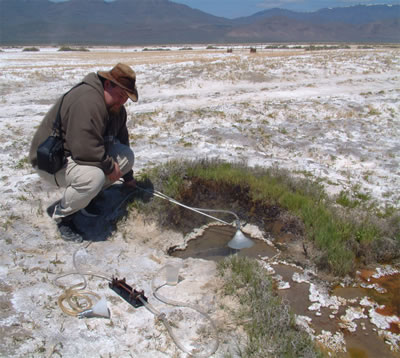
Nature of work
A geochemist is a person who usually deals with the relative abundance, distribution and migration of the earth's chemical elements as well as their isotopes. Modern geochemical research has been expanded to include the study of chemical transformations in rocks.Geochemist studies the movement of gases and chemicals into soil and water. He/she also works in oil exploration and environmental remediation. In addition to that, a geochemist usually works in the mining industry and studies mineral concentrations for extraction, the amount and the distribution of chemical elements in rocks and minerals. Then he/she studies the movement of those elements into soil and water systems.
Typical work activities in the laboratory include analyzing the age, nature and components of rock, soil and other environmental samples. Also, a geochemist usually conducts and checks the tests of samples, including gas chromatography, carbon and isotope data, viscosity and solvent extraction. Moreover, he/she works with a range of specialist equipment as a part of a research, including mass spectrometers, microscopes and electron microprobes. Furthermore, he/she undertakes field visits to collect site samples.
Environment of work
Although a geochemist spends some of his/her time in the lab, there is a good chance for him to spend a lot of time outdoor in the field to gather data and analyze samples on site which requires physical efforts.He/she might need to travel extensively, particularly in environmental areas that extend nationwide or overseas. Governmental jobs in geochemistry follow a relative regular schedule, but in industry–and especially in environmental management–hours are long, and some scientists are on call during weekends to respond to emergencies. Because many geochemists spend a significant amount of time in the field, this is a career for people who enjoy camping, hiking, and climbing. Working hours often extend outside normal office hours particularly when a geochemist is on field trips. Consultants and larger employers tend to provide flexible working schemes. Interpretation and consultancy work are demanded out-of-hours work and dedication.
At junior level, work is mainly laboratory-based. At more senior levels, the work involves more administration and operations management and fewer research-focused activities. Consultative jobs are more likely office-based.
Professional life
Le développement professionnel est lent parce que la géochimie exige de vastes connaissances dans chaque domaine des secteurs industriels, l’avancement dépend de l’intérêt du géochimiste et du choix de son domaine d’activité. Les études supérieures sont exigées dans la pétrochimie et les industries pétrolières. Les professionnels qui travaillent dans le gaz ou le pétrole peuvent occuper des postes de consultance, alors que les analystes peuvent évoluer vers des postes dans la géochimie environnementale, telle que la toxicologie, l’étude des sites chimiques ou agricoles négligés. Le candidat peut également avoir une opportunité dans les sociétés d’exploration.L’avancement dans le domaine académique dépend de la réussite des recherches, le chercheur peut être muté pour travailler comme consultant dans les secteurs de l’environnement, du pétrole et du gaz. Les salaires varient selon l’employeur, le lieu et la nature du travail. Le salaire d’un géochimiste débutant est de 50.000 L.S. environ, les salaires sont plus élevés dans les sociétés multinationales.
Getting the job
People apply to geochemistry from range of undergraduate studies, including math, physics, and oceanography, as well as chemistry and geology. Training outside geochemistry increasingly becomes beneficial because this field has become more interdisciplinary. A solid foundation in analytical chemistry and an expansion of coursework is recommended. Environmental related studies such as toxicology, hydrology, and sedimentology will prepare you for a job in environmental geochemistry. If you want to go into research, a Ph.D. and postdoctoral work are necessary. However, a career in industry or environmental management often does not require an advanced degree. Skills
A Candidate needs to show evidence of some skills such as, strong interpersonal skills, networking skills, intellectual and personal flexibility, good IT skills and database skills. Also, he/she should have research skills and methodical approach when analyzing samples and collecting data. In addition to that, a geochemist should be able to work as a part of a team as well as being able to manage a project or study. Moreover, he/she should approve his laboratory skills, such as general technical ability and safety awareness. Sources and references
For further information about this career a candidate can visit the following websites:- www.geochemsoc.org Geochemical Society.
- www.eag.eu.com The European Association of Geochemistry.
- www.geochemicalperspectives.org, a journal of Geochemistry.
- www.geolsoc.org.uk/geoscientist, Fellowship magazine of the Geological Society.
